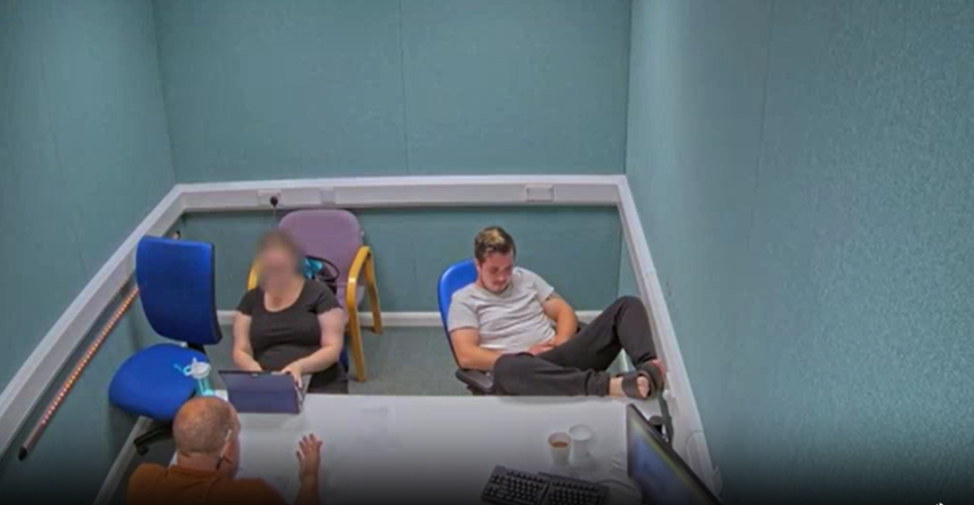As COVID-19 scythed through Ontario’s long-term care homes , a former provincial inspector said it was horrifying and infuriating to watch unfold.
“It's been absolutely devastating because you knew that these problems were inherent and the homes were not prepared,”; said a former long-term care inspector, whose identity Global News is protecting as the person still works in the sector.
Problems like overcrowding, resident neglect, and lack of infection prevention and control, all helped the novel coronavirus spread rapidly through Ontario nursing homes, leaving more than 3,700 people dead.
But they’re also issues that for years had been flagged in provincial inspection records in many of Ontario’s worst-hit homes, often with no changes or accountability.
“Inspectors knew this would be a problem someday and it happened,” the person said.
The former inspector, who left the ministry months before the pandemic began, is sounding the alarm over the state of inspections in Ontario’s nursing homes. The person described a system that is understaffed and overworked, and where inspectors lack crucial tools, like the ability to issue fines, when attempting to correct substandard care.
A provincial inquiry into COVID-19 deaths in long-term care homes, and a scathing auditor general's report released Wednesday, also expressed significant concerns about the effectiveness of inspections and a lack of enforcement.
“It's incredibly disappointing to see these repeated flagrant violations were not taken care of,”; said the former inspector, with years of experience.
“These problems that we had identified years earlier were completely ignored and bulldozed.”;
“There's a lot of stuff that goes unnoticed, overlooked or is not addressed in a timely fashion because we just simply don't have enough people.”;
During a nursing home inspection, when problems are found, like staff not following infection prevention protocols or unsanitary living conditions, inspectors can intervene by issuing a written notification, a voluntary plan of correction, a compliance order, or a “director referral order”; that can lead to the home having its licence revoked.
None of the actions come with a financial penalty.
“Inspectors don't have a lot of teeth,”; the former inspector said. “I can tell you to do something and you can do the bare minimum to meet it, but there's no penalty towards it.”;
In December 2017, the former Liberal government passed Bill 160 , which included financial penalties for long-term care homes for repeated non-compliance issues.
“I can guarantee you that these homes would work harder on the management of their properties and the management of the residents and staff if you threatened them with $50,000 in fines,”; the former inspector said.
The measures contained in the bill were never enacted as the Liberals lost a provincial election in 2018 to Doug Ford’s Progressive Conservative government, which did not implement them.
The bill called for fines of up to $100,000 for repeated violations.
“There was nothing in there that was controversial or that was not good for residents in long term care,”; said Liberal Health critic John Fraser. “There's no good political reason for people not to do this.”;
“They just let it die.”;
READ MORE: Ontario’s LTC sector not ‘sufficiently positioned, prepared’ to respond to COVID-19 in effective way
As part of its interim findings, Ontario’s commission on long-term care said Premier Doug Ford’s government needs to take “ urgent ”; action when it comes to the effectiveness of the province’s oversight and inspections system. The commission is expected to provide more details in a final report due April 30.
“We are concerned about the apparent lack of enforcement and follow-up verification of compliance with Orders issued by the ministry,”; the commission said in its second interim report.
The commission said the lack of fines or penalties “may feed into the lack of urgency”; for long-term care operators to fix problems with care.
Minister of Long-Term Care Merrilee Fullerton declined several requests for an interview. A ministry spokesperson said “administrative monetary penalties (AMPs) and re-inspection (RI) fees”; were supposed to come into effect on July 1, 2019, but were delayed “to provide more time to consult with stakeholders.”
“The Ministry will continue to consider other enforcement options, including financial penalties, as we move forward and will consider feedback and recommendations from current third-party reviewers in the process,”; spokesperson Rob McMahon said in an email.
Reduced inspections
Another problem, according to the former inspector and public health experts, began in 2018 when the Ministry of Long-Term Care, under Doug Ford’s Progressive Conservative government, moved away from so-called resident quality inspections (RQIs). RQIs are more thorough and often unannounced compared with complaint and critical incident inspections.
Complaint-based inspections, according to the former inspector, often mean a nursing home will know in advance of an inspector visit, giving the home a chance to superficially correct any problems.
“The first thing you do when you walk into any home, you see somebody pick up the phone and start panic dialing,”; the former inspector said. “They immediately start dialing every single unit [in the home.]
“They all are generally prepared.”;
In 2020, Ontario completed zero RQIs and just over 1,900 critical or complaint-based inspections and follow-ups. This is down from seven RQIs and just over 2,800 overall inspections completed in 2019 and down significantly from 370 RQIs in 2018, according to ministry data.
Dr. Nathan Stall, a geriatrician at Toronto’s Sinai Health, said that many provincial inspections of homes that experienced the worst outbreaks showed “gross deficiencies.”; He questions why more action wasn’t taken to fix the problems prior to the pandemic.
“There's no real follow up to ensure that the deficiencies have been corrected. And there's also no penalty or recourse for failing to do so,” Stall said.
“The inspection and oversight system clearly is not working.”;
Meanwhile, Ontario's Auditor General Bonnie Lysyk also called for increased comprehensive inspections and for fines or penalties to deal with widespread non-compliance.
In a special report, Lysyk's office found 18,200 instances of non-compliance in homes during inspections between January 2015 and June 2019. Her office had “significant concerns”; with how the province is favouring a “supportive” approach rather than taking a punitive approach to homes that break the rules..
“The Ministry could not explain what its supportive approach entailed or how it intends to implement it,”; the report said. “The sustained levels of and trends in non-compliance suggest that there are underlying issues that need to be addressed.”;
“[The issues] may require the firmer hand of enforcement to ensure that homes are places where residents live with dignity and in security, safety and comfort.”;
Home with bad track records
People protest outside the Tendercare Living Centre long-term-care facility during the COVID-19 pandemic in Scarborough, Ont., on Dec. 29, 2020. The LTC home was hit hard by the coronavirus during the second wave.
THE CANADIAN PRESS/Nathan Denette
In May 2020, the Canadian Armed forces released a disturbing report which detailed what military members said they witnessed when they went into five Ontario long-term care facilities in dealing with COVID-19 outbreaks.
Residents left in soiled diapers, infected patients living in cramped rooms next to non-infected residents, cockroach infestations, and mishandled medications, were part of the long list of problems military members alleged they witnessed.
It was also revealed that many of the allegations found in the CAF report had been flagged months or years earlier by ministry inspectors. These allegations included findings of improper care, poor record-keeping, and failures to dispense medication properly.
Altamont Care Community, for example, was named in the CAF report, which alleged that most residents didn’t receive three meals a day and found a significant number had pressure ulcers.
In a November 2019 inspection report , a ministry inspector issued 14 written notifications for non-compliance, eight voluntary plans of correction and two compliance orders.
The home, managed by Sienna Senior Living, would be among the hardest hit during the pandemic with 53 deaths at the home.
READ MORE: Ontario long-term care residents plead for release from COVID-19 confinement
In a statement to Global News, Sienna Senior Living, said the organization is “deeply saddened”; by the effects of COVID-19 on long-term care facilities.
“We have acted on all of the advice given to us by our own Chief Medical Officer and Chief Infection Prevention and Control Consultant, and external partners,”; said spokesperson Natalie Gokchenian. “Under the new leadership at the residence, swift action was taken to resolve inspection notices and all orders were lifted within a few weeks.
“As part of our commitment to ongoing improvements, many concrete steps have been taken at Altamont to improve resident care and infection prevention and control measures. As a result of the diligent work of our team members, there have been no resident cases of COVID-19 or subsequent outbreaks at Altamont since June 11, 2020.
But as the first wave moved to the second, long-term care homes again made headlines as outbreaks spread and death tolls quickly rose. A report from the Canadian Institute for Health Information found 7,260 Canadian seniors living in care homes died from March to the end of August 2020, while 7,479 died in the second wave which ended in February.
Stall called the province’s move to a reactive or complaint-based system “hugely problematic.”;
“When you only have inspections that are driven by resident complaints and you've shut out a lot of the family members so they can't come in to see what's going on, you've created a situation where you actually don't know what is going on inside these homes,”; he said.
READ MORE: Ontario nursing home where 81 died was later cited for 13 violations
Tendercare, where 81 residents died during an outbreak in December, is another example of a home with a lengthy history of violating provincial regulations.
Since 2015, the home has been cited over 45 times for issues like failing to report incidents of abuse, poor infection and prevention measures, and failure to properly treat skincare wounds.
In January 2021, inspectors issued 13 written notices, for failing to comply with health and safety regulations that included not giving residents enough water or timely medication, staff improperly using protective gear, and a lack of infection prevention measures.
Extendicare Canada, which manages Tendercare, said the home takes “swift action to rectify”; any issues flagged by inspectors.
“Progressive discipline is used for instances of non-compliance, and where appropriate, corrective action is taken up to and including termination,”; the statement said. “An outbreak the size of Tendercare’s resulted in large numbers of staff falling ill. The home is now back to a full staffing complement and the findings of the inspection report have been addressed.”;
Laura Tamblyn Watts, CEO of CanAge, a national seniors advocacy organization, said Ontario and other provinces should adopt a model where fines continue to run on a per-day basis until any health or building infractions are corrected.
“That really puts the screws to long-term care homes, which are flagrant offenders,”; Tamblyn Watts said. “It’s also important, however, to make sure that we are having an inspection regime which is looking for the right things so we don't set people up to fail.”;
Need for more inspectors
Inspecting nursing homes is not an easy task at the best of times and the pandemic has left some inspectors feeling “helpless.”;
The former inspector said there’s a dire need for more inspectors to police Ontario’s 626 homes. A limited pool of specialists often means that just one person will go into a home rather than a team of inspectors, which can lead to problems getting missed.
An intensive resident quality inspection of a home can take up to two weeks with a team of four or five, the former inspector said.
“When you're alone, you're busy and you're trying to get something done, you might work a little faster, you might miss something, or you can be misled or redirected by a home,”; the former inspector said.
Inspectors in Ontario come with different kinds of expertise, like dietary, nursing, or environmental services â experts in infection and prevention control or evaluating emergency plans.
READ MORE: Ontario’s worst hit nursing homes and who owns them
There are just three environmental inspectors in the whole province, according to the former inspector.
“They need enough inspectors so that they can respond to these incidences quickly, swiftly,”; the former inspector said.
The Ministry of Long-Term Care said there are 134 active inspectors to police the province’s 626 homes, and just three “Consultant/Environmental Inspectors.”;
“The ministry is continuing to ensure we have the resources to support our teams and has received approval to hire 32 additional inspectors. Recruitment is underway,” McMahon said.
Extendicare Canada is now facing a massive class-action lawsuit, which hasn't yet been certified, over claims the nursing home company failed to respond properly to the pandemic and was negligent in the care of residents.
Daryl Singer, a lawyer with Diamond and Diamond, is representing plaintiffs in the class action against several nursing homes in Ontario where thousands have died from COVID-19.
READ MORE: Documents reveal chaos inside Ontario nursing home during COVID-19 outbreak
Singer said the government ”;oversight mechanism”; failed miserably long before COVID-19 and there needs to be accountability.
”;If you get a parking ticket, a speeding ticket, you know that if you don't pay that ticket ... you’re going to get convicted,”; Singer said.
“What would happen if there was no enforcement? ... Would you pay your ticket? Of course you wouldn't,”; he said.
“I've seen many of these (inspection) reports and they're horrendous. There’s clearly negligence in so many of these cases.
“But no follow up. Absolutely no â zero â follow up.”;
Extendicare said it would respond to the lawsuit “in the appropriate venue, in due course.”;
While the government announced $933 million to create more beds in long-term care and upgrade facilities, there was no mention of increasing resident quality inspection in the budget.
The ministry said it is “looking forward”; to recommendations from the auditor general, Ontario’s Long-Term Care COVID-19 Commission, and the Ontario Ombudsman and will review any recommendations on the inspection framework
“The ministry is evaluating the inspection program, including the triaging of complaints and critical incident reports, with the goal to develop an improved, standardized inspection process that aligns with addressing risk in reactive and proactive inspections,”; McMahon said. “This evaluation will include what factors require annual inspections or reviews.”;
Without urgent change to how homes are scrunitized, the former inspector warned bad actors will continue to place our most vulnerable at risk.
“They need to put more money into funding and training and hiring inspectors and creating more positions,” the former inspector said. “It is urgent. They need to do it now.”;




